

Parenting style can greatly influence your child's behaviour, such as their self esteem to the way they interact with their peers. Untitled. Why Parenting Styles Matter When Raising Children. Developmental psychologists have long been interested in how parents affect child development.
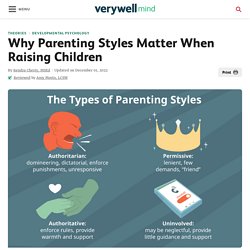
However, finding actual cause-and-effect links between specific actions of parents and later behavior of children is very difficult. Some children raised in dramatically different environments can later grow up to have remarkably similar personalities. Conversely, children who share a home and are raised in the same environment can grow up to have very different personalities. Despite these challenges, researchers have posited that there are links between parenting styles and the effects these styles have on children.
And some suggest these effects carry over into adult behavior. The Four Parenting Styles In the 1960s, psychologist Diana Baumrind conducted a study on more than 100 preschool-age children. The Four Parenting Styles And Their Influence On Children. Sometimes we plead our kids, sometimes we command them.
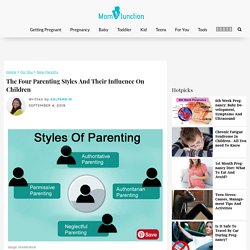
Sometimes we say yes to their fancies, and the other times we say no. But what exactly is our style of parenting? Most parents follow a mix of styles depending on the situation and the age of our children. But, interestingly, we do not realize that we may be leaning towards one of the four broad parenting styles demarcated by psychologists. Authoritative Parenting. What Is Authoritative Parenting?
Authoritative parenting is characterized by reasonable demands and high responsiveness.
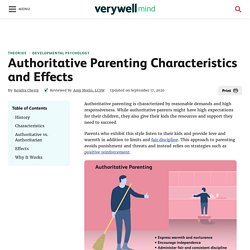
While authoritative parents might have high expectations for their children, they also give their kids the resources and support they need to succeed. Parents who exhibit this style listen to their kids and provide love and warmth in addition to limits and fair discipline. This approach to parenting avoids punishment and threats and instead relies on strategies such as positive reinforcement. Brief History During the 1960s, developmental psychologist Diana Baumrind described three different types of parenting styles: authoritarian, authoritative, and permissive. The authoritative parenting style is sometimes referred to as "democratic. " Authoritative Parenting Definition, Characteristics, Examples and More! Authoritative parenting is a style of raising children that involves thoughtful and intentional nurturing.
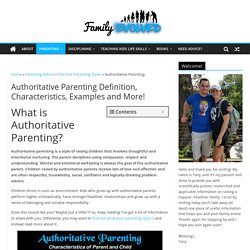
The parent disciplines using compassion, respect and understanding. Mental and emotional well-being is always the goal of the authoritative parent. 12 Ways to Become a More Authoritative Parent. There isn’t a single formula for raising children well.
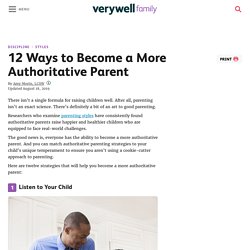
After all, parenting isn’t an exact science. There’s definitely a bit of an art to good parenting. The authoritative parenting style: An evidence-based guide. © 2010 - 2017 Gwen Dewar, Ph.D., all rights reserved.

Summary. Authoritarian Parenting. The Definition of Authoritarian Parenting. Authoritarian parenting is a parenting style characterized by high demands and low responsiveness.
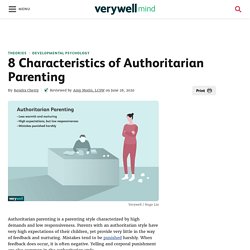
Parents with an authoritarian style have very high expectations of their children, yet provide very little in the way of feedback and nurturing. Mistakes tend to be punished harshly. When feedback does occur, it is often negative. Authoritarian Parenting Definition, Characteristics, Examples and More! What is Authoritarian Parenting?
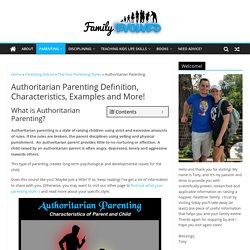
Authoritarian parenting is a style of raising children using strict and excessive amounts of rules. If the rules are broken, the parent disciplines using yelling and physical punishment. An authoritarian parent provides little to no nurturing or affection. 16 Authoritarian Parenting Style Pros and Cons – ConnectUS. There are several different parenting styles practiced around the world.
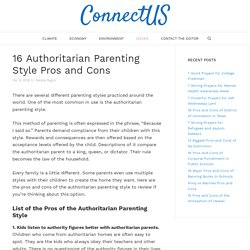
One of the most common in use is the authoritarian parenting style. This method of parenting is often expressed in the phrase, “Because I said so.” Authoritarian parenting: What happens to the kids? Photo by CEphoto, Uwe Aranas © 2010-2017 Gwen Dewar, Ph.D., all rights reserved The authoritarian parenting style is about being strict and stern.

It insists on unquestioning obedience, and enforces good behavior through threats, shaming, and other punishments. As defined by psychologists, it's also a style associated with less parental warmth and responsiveness (Baumrind 1991). That doesn't bode well for a child's health outcomes, especially if she's growing up in an otherwise stressful environment.
But what about other things -- like behavior problems? If authoritarian parents are demanding, doesn't that at least suggest they'd produce kids who are better-behaved and more successful in the classroom? Surprisingly, the evidence indicates otherwise. Authoritarianism and the alternatives Researchers recognize at least three alternatives to authoritarian parenting: In addition, authoritative parents encourage their kids to ask questions, and they explain the rationale behind the rules. China. Summary. Permissive Parenting. What Is Permissive Parenting? Permissive parenting is a type of parenting style characterized by low demands with high responsiveness. Permissive parents tend to be very loving, yet provide few guidelines and rules. These parents do not expect mature behavior from their children and often seem more like a friend than a parental figure.
These parents tend to be the polar opposite of the so-called "helicopter parents. " Instead of hovering over their children's every move, permissive parents are incredibly lax and rarely make or enforce any type of rules or structure. Their motto is often simply that "kids will be kids. " Because there are few rules, expectations, and demands, children raised by permissive parents tend to struggle with self-regulation and self-control. Permissive Parenting Definition, Characteristics, Examples and More!
What is Permissive Parenting? Permissive parenting is a style of raising children where the child makes important decisions and lives freely. While a permissive parent is affectionate, they struggle with disciplining. Setting limits is an important part of good parenting. Most parents hate the idea of causing their child to get upset. They don’t want to incite a tantrum, and they certainly don’t want their child to be angry at them. Haven't we all felt that way?
Besides, it's so hard to know whether what we're asking is developmentally reasonable. And we're so tired! Permissive Parenting - Why Indulgent Parenting Is Bad For Your Child - ParentingForBrain. Summary. Uninvolved Parenting. Characteristics and Effects of Uninvolved Parenting.
Uninvolved parenting, sometimes referred to as neglectful parenting, is a style characterized by a lack of responsiveness to a child's needs. Uninvolved parents make few to no demands of their children and they are often indifferent, dismissive, or even completely neglectful. The Major Parenting Styles. Uninvolved Parenting Definition, Characteristics, Examples and More!
What is Uninvolved Parenting? Uninvolved parenting is a style of raising children where the parent is negligent towards the child’s emotional and developmental needs. The uninvolved parent is preoccupied with their own desires and is unavailable to provide any guidance or nurturing to the child. A child raised by an uninvolved parent is often self-conscious, antisocial, immature, depressed and lonely. Uninvolved Parenting Style - Traits And Effects on Children. The Long-Term Impact of Neglectful Parents.
Source: JPagetRFPhotos/Shutterstock If you were emotionally or physically neglected as a child, it can be a difficult journey to healing. Neglect can be a hard thing to put your finger on, especially emotional neglect. Summary.